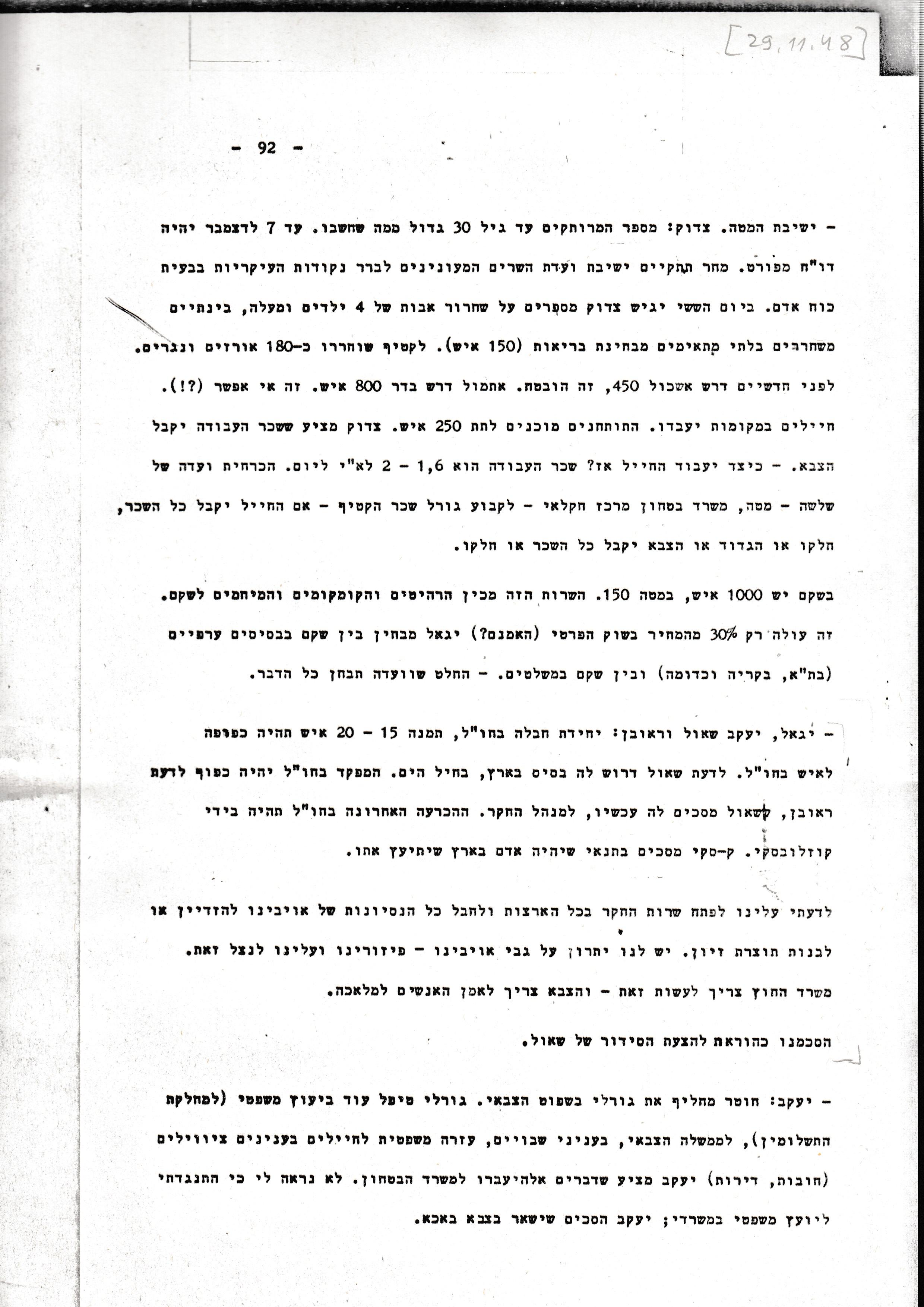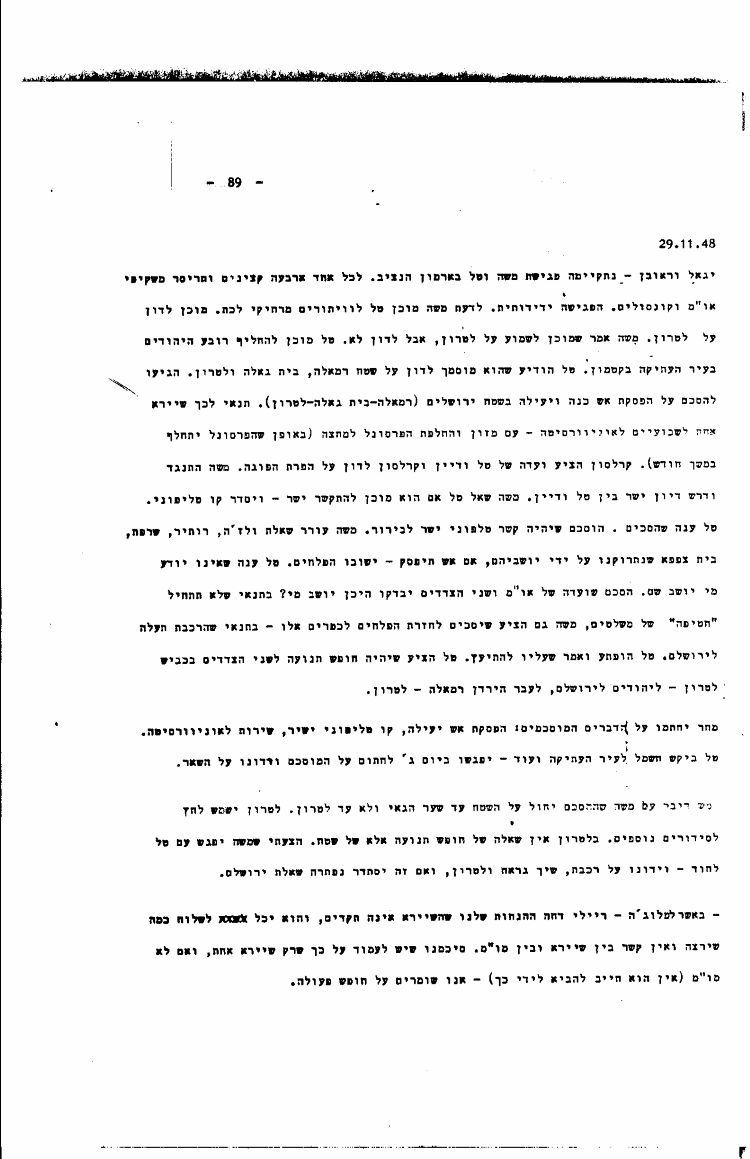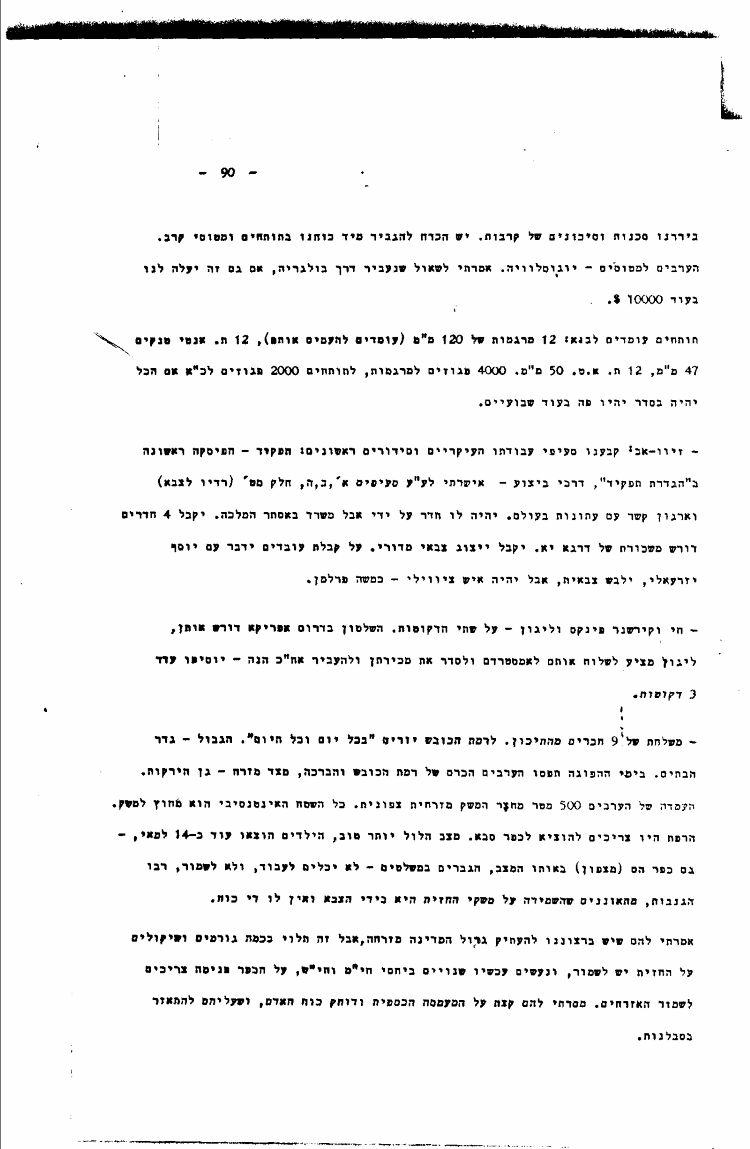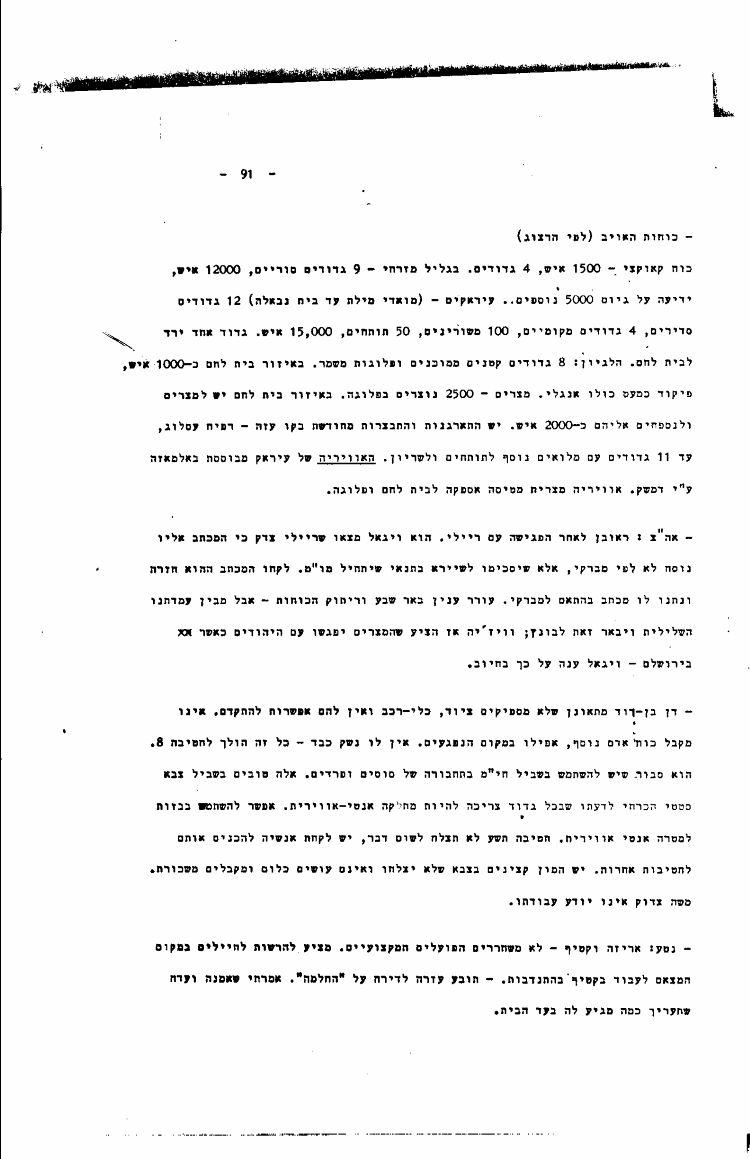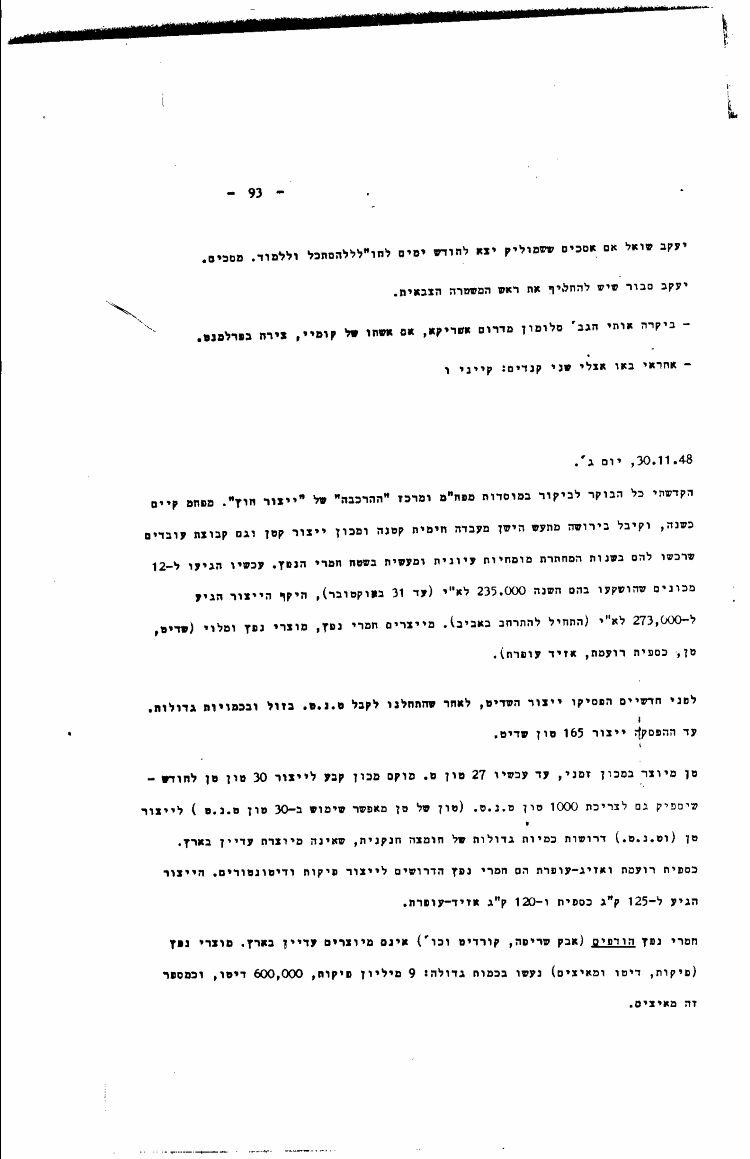1
of
Places:
Amsterdam
Bulgaria
Jerusalem
Be'er Sheva
ביר עסלוג'
Bethlehem
Kfar Hess
Kfar Sava
Ramat HaKovesh
Egypt
Gaza
Rafah
Damascus
Dan
Yugoslavia
Haifa
The use of the photograph is subject to the Copyright Law, 2007
29.11.1948
225146
[Monday,] November 29, 1948 Yigael [Yadin] and Reuven [Shiloah] – the Moshe [Dayan] and [Abdallah al-]Tall meeting took place at Armon HaNatsiv. Each one had four officers and a dozen UN observers and consuls. The meeting was friendly. In Moshe’s view Tall is prepared to make far-reaching concessions. He’s prepared to discuss Latrun. Moshe said he’s prepared to hear about Latrun, but not to discuss it. Tall is prepared to exchange the Jewish Quarter in the Old City for Katamon. Tall stated that he’s authorized to discuss the area of Ramallah, Beit Jala, and Latrun. They reached an agreement on a genuine and effective ceasefire in the Jerusalem area (Ramallah – Beit Jala – and Latrun). A condition for this: a convoy once every two weeks to the University – with food and replacement of half the personnel (such that [all] the personnel are replaced over the course of a month). [Colonel] Carlson [American UN observer] suggested a committee of Tall and Dayan and Carlson to discuss violation of the truce. Moshe objected, and insisted on direct talks between Tall and Dayan. Moshe asked Tall whether he’s willing to communicate directly – and he’ll arrange a telephone line. Tall replied that he agrees. It was agreed that there’d be direct telephone communication for consultation. Moshe raised the question of Walaja, Battir, Sharafat, Beit Safafa [villages southwest of Jerusalem], which were depopulated. If the fighting stops – the fellahin [Arab peasants] will return. Tall replied that he doesn’t know who’s stationed there. It was agreed that a UN committee and the two sides would examine who’s stationed where, on the condition that there be no “snatching” of strongholds. Moshe also suggested that he’d agreed to the return of the fellahin to these villages, on the condition that the train go up to Jerusalem. Tall was surprised and said that he’d have to consult. Tall suggested that there be freedom of movement for both sides along the Latrun road – for Jews to Jerusalem, and for Transjordan – Ramallah-Latrun. Tomorrow they’ll sign the agreed-upon provisions: an effective ceasefire, direct telephone line, convoys to the University. Tall requested electricity for the Old City and other things – they’ll meet on Tuesday [November 30] to sign what was agreed on and discuss the rest. Last night it was pointed out to Moshe [Dayan] that the agreement should cover the territory up to Sha’ar HaGai, not up to Latrun. Latrun will serve as pressure for additional arrangements. In Latrun it’s not a question of freedom of movement, but of territory. I suggested that Moshe meet with Tall separately – to discuss the railway, Sheikh Jarrah [and the road to Mount Scopus], and Latrun, and if it works out – then the question of Jerusalem is resolved. As to Faluja – Riley rejected our assumptions that the convoy is not a precedent, and he can send as much as he wants, and there’s no link between a convoy and negotiation. We agreed that it’s necessary to insist on having just one convoy, and if [the Egyptians] don’t [agree to start] negotiations (he isn’t obligated to make it happen) – then we reserve freedom of action. We considered the dangers and risks of hostilities. It’s necessary to immediately increase our strength in cannons and fighter planes. [Illegible word, evidently: The delay] in planes – Yugoslavia. I told Shaul [Avigur] that we’ll go through Bulgaria, even if it costs us an additional $10,000. Cannons due to arrive: 12 120 mm mortars (about to be loaded), 12 anti-tank 47 mm C. [cannons], 12 anti-tank 50 mm C, 4,000 shells for mortars, for cannons 2,000 shells each, if all goes well they’ll be here within two weeks. – [Yitzhak] Ziv-Av [head of the hasbara [explanation] and public relations division of the Defense Ministry]: We decided on the main provisions of his job and the initial arrangements. The position is the first paragraph in the “job description.” Modes of implementation – for now I approved provisions A, B, E, part of I (army radio) and the organization of communication with international press. He’ll have a room next to me, but an office on Esther HaMalka [St.] [a branch of the Defense Ministry] will be given 4 rooms, demands paygrade 11. [He]’ll receive military representation from [Ya’akov] Dori. Regarding the assignation of workers, he’ll speak with Yosef Yizraeli. [He]’ll dress in military clothing but will be a civilian – like Moshe Pearlman [IDF spokesman]. – Hai [Issachar] and [Nachman] Kirschner, [Aryeh] Pincus [sp.] and Ligum [sp.] [of the South African Zionist Federation] – regarding the two Dakotas. South Africa is requesting them. Ligum suggests sending them to Amsterdam and arranging their sale and then transferring them here – they’ll add another 3 Dakotas. – A delegation of 9 members of the Tichon [central-eastern front, in the Sharon]: Ramat HaKovesh is under fire “all day every day.” The border ¬– the houses’ fencing. During the truce the Arabs seized Ramat HaKovesh’s vineyard and the pool, from the eastern side of the vegetable garden; the Arabs’ position is 500 m northeast of the kibbutz grounds. All the area of intensive [crop cultivation] is outside the kibbutz. The cow shed had to be transferred to Kefar Saba. The state of the chicken coop is better, the children were removed as early as May 14 [after the kibbutz was shelled] – Kefar Hess is in the same situation, the men are in strongholds – they can’t work, and can’t guard, thefts have increased. They complain that protection of the frontline settlements is in the army’s hands and it doesn’t have enough force. I told them that we want to shift the state’s border eastward, but this depends on several factors and considerations. The front has to be protected, and changes are currently being made in garrison and Hayish relations; the internal countryside has to be protected by civilians. I told them a little about the financial burden and manpower shortage, and that they must be patient. – The enemy forces (according to [Chaim] Herzog [of the intelligence division]: Qawuqji’s force – 1,500 men, 4 battalions (in the Eastern Galilee [actually – the Central Galilee]). 9 Syrian battalions – 12,000 men, reportedly 5,000 more being enlisted. Iraqis – (from Wadi Milek to Beit Nabala) – 12 regular battalions, 4 local battalions, 100 armored vehicles, 50 cannons, 15,000 men. One battalion went down to Bethlehem. The Legion: 8 small mechanized battalions and garrison battalions. In the Bethlehem area there are about 1,000 men; the command is almost entirely English. Egypt – 2,500 under siege in Faluja. In the Bethlehem area the Egyptians and those accompanying them have about 2,000 men. There’s renewed organization and fortification along the Gaza – Rafiah – ‘Isluj line, up to 11 battalions with reserves, in addition to cannons and armored [corps]. Iraq’s air fleet is based in Al-Mazzeh near Damascus. An Egyptian air fleet is flying supplies to Bethlehem and Faluja. – Afternoon: Reuven [Shiloah] after meeting with Riley. He and Yigael [Yadin] discovered that Riley was right, because the letter to him was worded not per my cable, but instead [stated] that they would agree to a convoy on the condition that we start negotiations. They took that letter back and gave him a letter in line with my cable. [He] raised the issue of Beersheba and the confinement of forces – but he understands our negative position and will clarify this to Bunche. [Political Advisor to the UN Truce Supervision Organization, based in Haifa] Henry Vigier then suggested that the Egyptians meet with the Jews when [Tall and Dayan meet] in Jerusalem – and Yigael [Yadin] responded affirmatively to this. – Ben Ben-David [Dunkelman] complains that the equipment and vehicles aren’t enough, and they’re unable to advance. He isn’t receiving additional manpower, even in place of casualties. He doesn’t have heavy weapons – it all goes to Brigade 8 [the other armored brigade]. He thinks that garrison should use horses and mules for transport. These are fine for a static army. It’s imperative in his view that each battalion have an anti-air division. Besa [medium machine gun]s can be used for anti-air purposes. Brigade Nine [Oded] won’t succeed at anything; its men should be taken and put in other brigades. There are many officers in the army who won’t be successful and don’t do anything and receive a salary. Moshe Zadok [head of the General Staff Personnel Department] doesn’t know how to do his job. – Neta [Harpaz] – [regarding] packing and fruit harvesting; the skilled workers aren’t being released. [He] suggests allowing soldiers to volunteer for the harvest where they are stationed. He demands help for Dora [Bloch-Blumenfeld] for [taking over the] Hachlama [recuperation facility]. I said I’d appoint a committee to assess how much she deserves for the building. – [General] Staff meeting. [Moshe] Zadok: The number of those confined [engaged in work at the settlements] below age 30 is larger than was thought. By December 7 there’ll be a detailed report. Tomorrow there’ll be a meeting of the committee of ministers interested in clarifying the main points of the manpower problem. On the sixth day [of the month?] Zadok will present the figures regarding the release of fathers with four or more children. In the meantime only those unsuitable for health reasons are being released (150 men). About 180 packers and woodworkers were released for the fruit harvest. Two months ago [Levi] Eshkol requested 450, which was promised him. Yesterday [Menachem] Bader requested 100 men. This is impossible (?!). The soldiers at the locations will work; the artillery corps is prepared to provide 250 men. Zadok proposes that the army receive the work wages. How then will the soldier be able to work? The work wage is P£ 1.6 – 2 per day. It’s necessary to have a committee of three – Staff, Defense Ministry, Agricultural Center – to decide the fruit harvest wages – whether the soldier receives all or part of the wage, or the battalion or the army receives all or part of the wage. There are 1,000 men in Shekem [the army’s food service], 150 at the Staff. This service provides the furniture and kettles and heating appliances for Shekem. It only costs 30% of the private market prices (really?). Yigael [Yadin] distinguishes between Shekem at the homefront bases (Tel Aviv, the Kirya [government compound], and the like) and Shekem in the strongholds. It was decided that a committee would examine all of this. – Yigael [Yadin], Ya’akov [Dori], Shaul [Avigur], and Reuven [Shiloah]: a sabotage unit abroad, numbering 15-20 men, will be subordinate to someone abroad. In Shaul’s view it needs a base in the country, in the Navy. The commander abroad will now be subordinate, in Reuven’s view, to which Shaul agrees, to the research administration [administrator?] [in the Foreign Ministry]. The final decision abroad will be in the hands of Kozlowski [Pinchas Sapir, head of procurement in Europe]. K-ski [Sapir] agrees, on the condition that there be someone in the country for him to consult with. In my opinion we should develop a research service in all the countries, and sabotage all of our enemies’ efforts to arm themselves or produce arms. We have an advantage over our enemies – our dispersion, and we should exploit this. The Foreign Ministry should do this – and the army should train people for this task. We agreed as a [temporary] order to Shaul’s proposed arrangement. Ya’akov [Dori]: [Aharon] Hoter[-Yishai] is replacing [Avraham] Gorali in the military judicial system [i.e., as the military prosecutor]. Gorali also handled legal advice (for the Payments Department), for the military government, on the matter of POWs, legal assistance for soldiers and civilian matters (debts, apartments). Ya’akov suggests that these matters be transferred to the Defense Ministry. I didn’t think so, because I objected to having a legal advisor in my office; Ya’akov agreed that he would remain in the army, in the Personnel Department. Ya’akov asks if I would agree to have [Artillery Corps Commander] Shmulik [Admon] go abroad for a month to watch and learn. [I] agree. – Mrs. Salomon from South Africa, mother of [Michael] Comay and a parliamentary delegate, visited me. After her two Canadians came to see me: Caney [sp.] and [unnamed].





